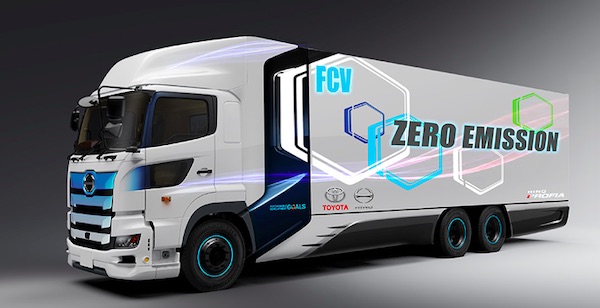Toyota City, Japan, Oct 13, 2020 - (JCN Newswire) - Asahi Group Holdings, Ltd. (Asahi Group), Seino Transportation Co., Ltd. (Seino Transportation), NEXT Logistics Japan Co., Ltd. (NLJ), Yamato Transport Co., Ltd. (Yamato Transport), Toyota Motor Corporation (Toyota), and Hino Motors, Ltd. (Hino) have agreed to conduct on-the-road trials of heavy-duty fuel cell electric trucks (heavy-duty FCETs) starting in spring of 2022, accelerating the early commercial application of heavy-duty FCETs and contributing to the development of a sustainable society. This may be achieved, at least in part, by reducing CO2 emissions from heavy-duty FCETs, which account for approximately 70 percent of all CO2 emissions from commercial vehicles in Japan*. Toyota and Hino are jointly developing heavy-duty FCETs, and Asahi Group, NLJ, Seino Transportation, Yamato Transport, and Toyota will perform the road trials in their logistics operations.
 |
| Heavy-duty FCETs (rendering) |
The heavy-duty FCETs used in highway transportation must have an adequate range and load capacity as well as being able to refuel quickly. Fuel cell systems, which are powered by high-energy-density hydrogen, are believed to be effective for the electrification of heavy-duty trucks. The heavy-duty FCETs that will be developed are anticipated to have a target range of approximately 600 km. The objective is to meet high standards for both environmental performance and practicality as a commercial vehicle.
Each of the companies participating in the trials have positioned global environmental issues as key management issues, and are taking various actions including reducing energy consumption in manufacturing processes and reducing environmental impact in logistics operations. Going forward, each company will accelerate its efforts for early practical application of heavy-duty FCETs with the aim of contributing to the development of a sustainable society.
*Trucks and buses with a gross vehicle weight of over 3.5 tons, according to research by Hino, as of September 30, 2020.
For the full information, visit https://bit.ly/371BWai.
About Toyota Motor Corporation
Toyota Motor Corporation (TMC) is the global mobility company that introduced the Prius hybrid-electric car in 1997 and the first mass-produced fuel cell sedan, Mirai, in 2014. Headquartered in Toyota City, Japan, Toyota has been making cars since 1937. Today, Toyota proudly employs 370,000 employees in communities around the world. Together, they build around 10 million vehicles per year in 29 countries, from mainstream cars and premium vehicles to mini-vehicles and commercial trucks, and sell them in more than 170 countries under the brands Toyota, Lexus, Daihatsu and Hino. For more information, please visit www.toyota-global.com.
Source: Toyota Motor Corporation
Copyright 2020 JCN Newswire . All rights reserved.